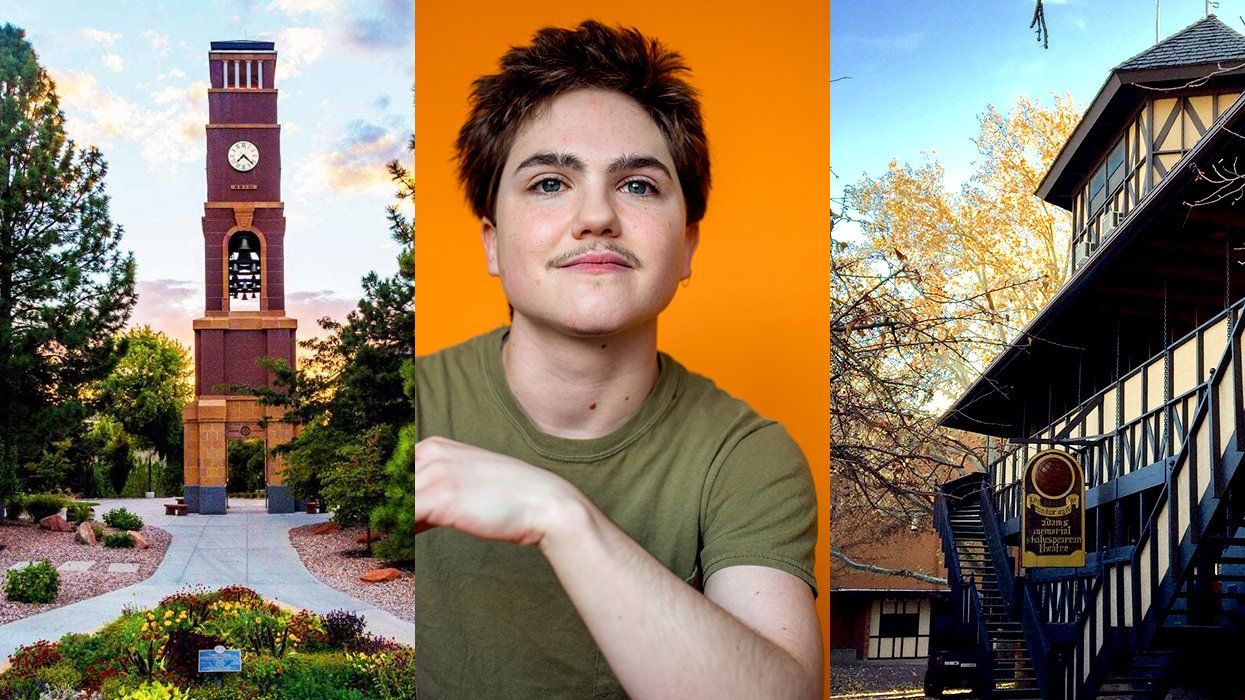A professor at a university in Utah is suing after he was found to violate Title IX for discriminating against nonbinary students. Now, the former student, Finley Caciola, 23, worries that, ultimately, the professor will be able to continue making gender-diverse students feel uncomfortable.
Caciola, a former student at Southern Utah University, came forward a few years ago with allegations of discrimination by Richard Bugg, a professor in the theater program.
Caciola detailed their distressing experiences at SUU, where they pursued a theater major. Their journey, marked by encounters with Bugg, paints a picture of a campus grappling with the evolving landscape of gender identity and inclusivity in a fairly conservative state.
“My very first impression of Richard Bugg was actually courtesy of a current student at SUU,” Caciola told The Advocate, shedding light on the early warning they received about the professor’s alleged queerphobic tendencies. “I was the first nonbinary student that many professors had ever had, at least the first out one.”
On their first day of senior year, September 9, 2021, along with many peers, Cacilola was taken aback by disturbing messages on the professor’s syllabus. It was contradictory and closed-minded, Caciola said.
“This class… is not a forum for social justice causes, nor a microcosm for political action movements,” the syllabus read, according to Caciola. “The discussion of all philosophies is welcome here, so long as it is part of our efforts to understand the craft and further the development of the acting characters we are creating. Please do not demand of your classmates any political or social compliance to your particular philosophy. The class will be a safe space in this definition only: We will attempt to create an atmosphere in which each student feels safe to risk failure. Please don’t expect to be ‘safe’ from exposure to ideas or expressions that might be counter to your own views. You will best be served if you approach this class experience with an open mind and a loving respect for freedom of thought and speech.”
Caciola perceived this as a direct challenge to their identity and the identities of other queer students.
During a class activity, Bugg continually misgendered Caciola, leading to a verbal confrontation.
“I was misgendered every single time Richard referred to me,” Caciola said. “As this went on, more and more people politely corrected him, and he became huffy and indignant,” Caciola recounted.
Following these incidents, Caciola filed a Title IX claim against Bugg, alleging discrimination and harassment based on gender identity. The ensuing investigation and hearing, Caciola said, affirmed their claims, leading to sanctions against Bugg.
However, the issue took a turn when Bugg filed a lawsuit against six SUU officials in 2022, challenging the findings and sanctions. In his suit, Bugg seeks various declarations and relief and questions the university’s policies and obligations under them.
The Advocate reached out to attorneys for Bugg and the Utah attorney general’s office, which is representing the university in the case. Neither responded to requests for comment.
At the time Bugg filed his complaint, SUU released a statement to local media that said, "Prior to the filing of the federal lawsuit, SUU followed established policies and conducted an impartial investigation and hearing in accordance with due process. While there is no SUU policy that specifically requires the use of gender pronouns, the University must strictly adhere to federal regulations regarding anti-discrimination (Policy 5.27) and sexual misconduct (Policy 5.60) under Title VII and Title IX respectively. Those regulations were updated in January 2021 with the Biden Administration expanding the definition of sex to include gender identity. SUU employees are required to follow these federal guidelines, just as are all people who are employed in either the private or public sectors."
The university added that President Joe Biden's executive order on the new policies included protection from discrimination based on gender identity.
"Southern Utah University is committed to the principles of free speech guaranteed by the U.S. and Utah constitutions..." it continued.
Caciola’s experience highlights the broader issues of gender identity recognition and the challenges nonbinary students face in educational settings. A study published last year in the Journal of Diversity in Higher Education found that nonbinary students, especially nonbinary students of color, often find college campuses less safe compared to other students.
"Nonbinary students reported feeling less safe on and around campus and were more likely to be verbally threatened, stalked, and sexually assaulted than their peers. In terms of mental health indicators, nonbinary students reported significantly worse outcomes than their peers. Nonbinary students were also significantly less likely to be involved in extracurricular activities," the study states.
Reflecting on the ordeal and the ongoing lawsuit, Caciola expressed concern for themselves and future students at SUU.
“This has never been about conformity for me; it’s been about the quality of life of the students. And for many students, being around people like Richard diminishes our quality of life and obliterates our equal access to education,” they said.





































































Charlie Kirk DID say stoning gay people was the 'perfect law' — and these other heinous quotes